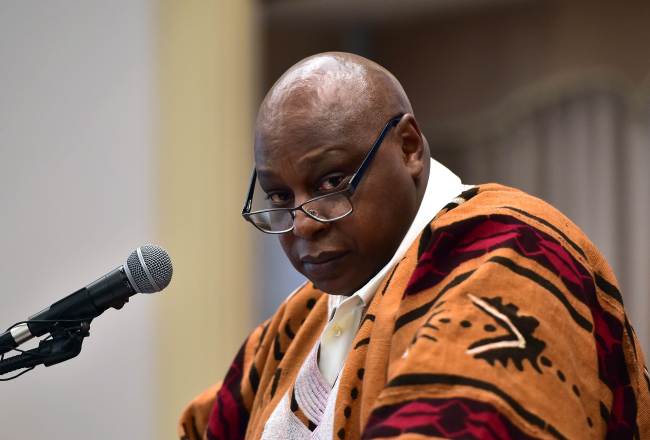U.N. official criticizes Korea for restricting freedom of speech
By Ock Hyun-juPublished : Jan. 29, 2016 - 21:51
A senior U.N. rights official expressed concerns Friday that the Korean authorities were stifling the rights to public assembly and free speech.

Maina Kiai, the special rapporteur on the rights to freedom of peaceful assembly and of association, took issue with the government’s use of law and public force to restrict public assemblies and association, as well as a lack of dialogue channels between the authorities and citizens.
“I heard government officials repeatedly cite people’s ‘inconvenience’ as a rationale for restricting protests. They have also cited security challenges (from North Korea) as a reason for limiting rights,” Kiai said in a press briefing held on Friday afternoon in central. “But they should not be an excuse for unduly limiting rights.”
“I am confident that the government has the capacity to get it right.”
The Kenyan human rights lawyer visited the country from Jan. 21-29 to investigate possible violations of the rights to public assembly and free speech after an association of civic groups filed a petition with the U.N.
In recent months, Koreans took to the streets to protest against the Park administration’s push to adopt state-authored history textbooks, reform the labor market and open the agricultural sector, which led to police firing water cannon mixed with tear gas into the crowd.
The police water cannon blast left Baek Nam-gi, a 69-year-old activist, unconscious at a hospital.
“Certain police tactics during assemblies concern me, such as the use of water cannons and bus barricades,” Kiai said in the briefing. “But aggression only begets aggression.”
Protestors have lashed out at the police for abusing its authority to silence criticism of the government, while police have stressed its role in maintaining public order.
Following a series of anti-government protests last year, thousands of citizens faced questioning on charges of violating the demonstration act, disrupting traffic and using violence during protests.
“It is important that the government and protestors build trust to prevent violence,” he said. “The authorities should guarantee people are not punished for participating in peaceful assemblies. Rights should come before restrictions.”
During his visit, the U.N. special rapporteur visited labor union groups, minor political parties, and representatives of sexual minorities and civic groups. He met with the bereaved families of the victims of the Sewol ferry tragedy and students staging an outdoor sit-in outside the Japanese Embassy in Seoul to protest the relocation of the memorial for sex slavery victims by Japan during World War II.
In an effort to seek a balanced view, Kiai also consulted government officials from the Foreign Ministry, Labor Ministry, Justice Ministry, as well as officials from the Supreme Court, Constitutional Court and the nation’s Human Rights Commission.
Kiai plans to write a report on Korea and submit it to the United Nations Human Rights Council in June.
By Ock Hyun-ju (laeticia.ock@heraldcorp.com)
-
Articles by Ock Hyun-ju











![[Today’s K-pop] BTS pop-up event to come to Seoul](http://res.heraldm.com/phpwas/restmb_idxmake.php?idx=644&simg=/content/image/2024/04/17/20240417050734_0.jpg&u=)





![[KH Explains] Hyundai's full hybrid edge to pay off amid slow transition to pure EVs](http://res.heraldm.com/phpwas/restmb_idxmake.php?idx=652&simg=/content/image/2024/04/18/20240418050645_0.jpg&u=20240419100350)

![[Today’s K-pop] Zico drops snippet of collaboration with Jennie](http://res.heraldm.com/phpwas/restmb_idxmake.php?idx=642&simg=/content/image/2024/04/18/20240418050702_0.jpg&u=)